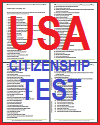| Civic Participation in the Affairs of Government |
| www.studenthandouts.com ↣ Social Studies ↣ Civics ↣ Civic Participation |
 |  |  | ||||||||
| Campaign Poster Templates | American Citizenship Test | Meet the Candidate Worksheet |
|
Civic participation is a crucial element of American democracy for several reasons, as it plays a fundamental role in shaping and maintaining a healthy democratic system. Here is why civic participation is so essential:
Preservation of Democracy: Civic participation is the lifeblood of democracy. It ensures that the government remains accountable to the people and responsive to their needs and concerns. Without active citizen engagement, democracy can become stagnant and unrepresentative. Representation: Democracy is based on the principle of representation, where elected officials are chosen to represent the interests and preferences of the citizenry. Civic participation through voting and advocacy ensures that citizens have a voice in shaping government policies and decisions. Checks and Balances: Civic participation provides a critical check on the power of government institutions. It helps prevent the abuse of power by holding elected officials and government agencies accountable for their actions. Policy Influence: Active citizens have the opportunity to influence the formulation and implementation of public policies. They can advocate for policies that reflect their values, priorities, and concerns. Social Progress: Civic engagement has been instrumental in advancing social progress and civil rights in the United States. Movements for racial equality, women's rights, LGBTQ+ rights, and other social justice causes have relied on the active participation of citizens to effect change. Community Building: Civic participation fosters a sense of community and shared responsibility. It encourages individuals to work together for the betterment of their communities, promoting social cohesion and cooperation. Accountability: Through civic participation, citizens can hold elected officials accountable for their promises and actions. Elected representatives are more likely to act in the best interests of their constituents when they know they will be held responsible for their decisions. Informed Decision-Making: Active citizens are more likely to be informed about current events, government policies, and candidates for public office. Informed voters make more thoughtful decisions at the ballot box. Conflict Resolution: Civic participation provides peaceful avenues for addressing conflicts and grievances. Peaceful protests, advocacy, and public discourse are essential tools for resolving disagreements within a democratic society. Democratic Legitimacy: High levels of civic participation enhance the legitimacy of the democratic process. When more people participate, the government is seen as more representative of the entire population. Political Accountability: Civic engagement encourages elected officials to remain responsive to the needs and concerns of their constituents. Knowing that they can be voted out of office if they fail to represent their constituents effectively incentivizes politicians to remain accountable. Diverse Perspectives: Civic participation ensures that a diverse range of perspectives and voices are heard in the political process. This diversity enriches the quality of public discourse and leads to more inclusive and equitable policies. Education and Awareness: Engaging in civic activities, such as voting, community organizing, and attending public meetings, fosters greater political awareness and understanding among citizens. Empowerment: Civic participation empowers individuals by giving them the agency to shape their communities and influence government decisions. It reinforces the idea that citizens are active agents of change. National Progress: Civic participation is essential for addressing pressing national challenges, such as climate change, public health crises, economic disparities, and more. These issues require collective action and citizen engagement. In summary, civic participation is crucial to the health and vitality of American democracy. It empowers citizens, ensures accountability, promotes representation, and facilitates social progress. A strong democracy depends on active and engaged citizens who take an active role in shaping the direction of their government and society. |
| www.studenthandouts.com ↣ Social Studies ↣ Civics ↣ Civic Participation |








